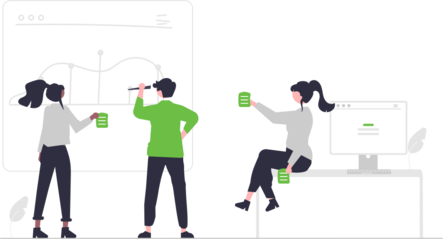In many companies, the mentality is still characterized by "work to rule". Clearly structured, monotonous tasks tempt you to hand over responsibility and stop thinking. This slows down the work ethic and the employee gets stuck in the classic 9 to 5 routine. At the end of the day everything is left behind - you are already in leisure mode. The employee withers away to a lonely island.
Working in a team can help here. If tasks are shared with team members, or depend on each other, then each employee must take responsibility for their part. This also requires more careful work from the team. Colleagues rely on each other's work and integrate each other in their jobs. Work is now done in a team and no longer as an individual. Regular exchange and the sense of community strengthen the work ethic.
Another advantage here is the reliability of individual people. If several team members are familiar with a project or work step, then the work can be designed redundantly.
In order to create such a working environment, the team leader must also be trained accordingly. The motto here is leadership and self-leadership. Caution is required, especially when restructuring existing structures. Employees must be involved from the start in this process of team development.
